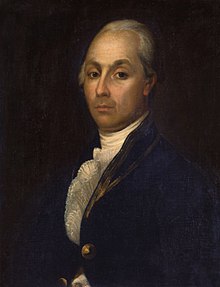Alexander Radishchev
Aleksandr Nikolayevich Radishchev | |
|---|---|
 Earlier than 1790. By unknown author | |
| Born | August 31, 1749 |
| Died | September 24, 1802 (aged 53) |
| Occupation | Writer |
Aleksandr Nikolayevich Radishchev (Russian: Алекса́ндр Никола́евич Ради́щев) (August 31, 1749–September 24, 1802) was a Russian author and social critic who was arrested and exiled under Catherine the Great. He brought the tradition of radicalism in Russian literature to prominence with the publication in 1790 of his Journey from St. Petersburg to Moscow. His depiction of socio-economic conditions in Russia earned him exile to Siberia until 1797.
Radishchev was born into a minor noble family in Moscow, and as a young man studied at the University of Leipzig. His foreign education, however, led him to become disenchanted with the Russia he saw around him when he returned in 1771. He lauded revolutionaries like George Washington and praised the French Revolution. His most famous work - A Journey from St. Petersburg to Moscow - is a critique of Russian society. He was especially critical of serfdom and the limits to personal freedom imposed by the autocracy.
Catherine the Great read the work, viewed Radishchev's calls for reform as evidence of Jacobin-style radicalism, and ordered copies of the text confiscated and destroyed. He was arrested and condemned to death. This sentence was later commuted to exile to Siberia. He was freed by Catherine's successor Tsar Paul, and attempted again to push for reforms in Russia's government, but was unsuccessful. In 1802 a despondent Radishchev - fearful of another Siberian exile - committed suicide by drinking poison.
